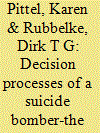| Srl | Item |
| 1 |
ID:
112390


|
|
|
|
|
| Publication |
2012.
|
| Summary/Abstract |
This paper provides a theoretical analysis of suicide attacks and defection. First, decision processes of potential attackers are examined from an economist's perspective. The results are then applied to insights from behavioural economics and psychology. We derive conditions under which agents decide to become suicide bombers-or to announce an attack and defect later. Taking account of hyperbolic discounting we show why the decision to commit a suicide attack can be time-inconsistent and what internal manipulation mechanisms (arising from cognitive dissonance and terror management) and external manipulation mechanisms (employed by terrorist organizations and governments) might prevent or foster time-inconsistency.
|
|
|
|
|
|
|
|
|
|
|
|
|
|
|
|
| 2 |
ID:
150064


|
|
|
|
|
| Summary/Abstract |
This paper presents a theoretical model and addresses several issues related to life cycle cost analysis to illustrate how time-inconsistent preferences affect consumer choice. The particular case study selects involved consumer choice between a vehicle with high initial acquisition cost but low ownership cost (e.g., an Electric Vehicle, EV) and one with a low initial acquisition cost but high ownership cost (e.g., a conventional Internal Combustion Engine Vehicle, ICEV). To test our theoretical analysis, we conduct an empirical study on how time discounting rates affect consumer choice between ICEVs and EVs with different initial cost ratios. From the survey results, we find that individuals with higher present bias showed irrational purchase behavior even when controlling for wealth level. Specifically, people making some “stronger bias to present” decisions chose higher total cost ICEVs with lower initial cost but higher ownership cost over lower total cost EVs with higher initial cost and lower ownership cost. However, people’s long-term discount is not correlated with irrational vehicle purchase behavior. Furthermore, we study the present bias and long-term discount rate in one scenario and found present bias to be correlated with irrational behavior.
|
|
|
|
|
|
|
|
|
|
|
|
|
|
|
|
| 3 |
ID:
076880


|
|
|
|
|
| Publication |
2007.
|
| Summary/Abstract |
Although many decisions involve a stream of payoffs over time, political scientists have given little attention to how actors make the required tradeoffs between present and future payoffs, other than applying the standard exponential discounting model from economics. After summarizing the basic discounting model, we identify some of its leading behavioral anomalies-declining discount rates; preference reversals; higher discount rates for smaller payoffs than for larger payoffs and for gains than for losses; framing effects based on expectations; and a preference for ascending rather than descending sequences. We examine the leading alternative models of discounting and then apply a quasi-hyperbolic discount model to the problem of cooperation in iterated Prisoner's Dilemma games. We demonstrate that if actors display the widely observed tendency to highly discount the immediate future, then cooperation in an iterated Prisoner's Dilemma game is more difficult than Axelrod suggests.
|
|
|
|
|
|
|
|
|
|
|
|
|
|
|
|